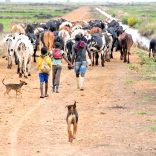Mozambique: 50,000 doses of foot-and-mouth vaccine needed to stop outbreak
Mozambique: Rwanda refugee detention; more gas problems; Crisis Group links troops to solving grievances – By Joseph Hanlon

In this issue
Price of support
Journalist handed over to Rwanda
Setback to gas
Galp says no
Total cuts more staff
G7 vs big capital on gas
Foreign troops
Crisis group yes to troops, but address grievances
EU help slow
Maputo: + Elevated railway?
Price of military support?
Missing Rwandan journalist handed over to embassy
Rwandan journalist Ntamuhanga Cassien was detained on 23 May by a Mozambican police team accompanied by a Rwandan security official. Cassien was held at the 18th police station in Maputo city until 1 June, when he was handed over to the Rwandan embassy. There is no extradition agreement between Rwanda and Mozambique and Cassien has been in exile in Mozambique since 2017. The Mozambique government has confirmed has had been granted refugee status. Thus his detention of totally illegal.
Cassien’s abduction is believed to be in response to a request from the Rwandan president, Paul Kagame, to President Filipe Nyusi, in exchange for support in the fight against the insurgency in Cabo Delgado. (Mediafax, Evidencias, Canalmoz, Zitamar, O Pais)
Savana (11 June) reports that after the 2019 assassination in Matola of Louis Baziga, then the head of Rwandan community in Maputo, a list of six Hutu Rwandan refugees in Maputo that Kagame wanted was published on social media. Since then, one has died and another left Mozambique. But the other four are worried. There are about 4000 Rwandans in Mozambique, most in the Maratane refugee centre in Nampula. Neither government has made any comment.
More setbacks to gas
- Galp says no investment until government works with local people; Moz not in 5 year-plan
“Before Galp starts investing in the project, the government needs to work with the local population to create the right kind of stability and social cohesion, as well as security, on the ground … That may take a while,” Galp CEO Andy Brown told Reuters (15 June).
ExxonMobil is the lead company for area 4, the farthest offshore, with a 25% interest. The Italian company ENI also has 25%. The China National Petroleum Company holds 20%. The Portuguese company Galp owns 10%, as does South Korea’s Kogas and the Mozambique government’s ENH.
ExxonMobil has delayed the final investment decision until 2023, but Brown told Reuters that Cabo Delgado is no longer in Galp’s five year capital expenditure budget.
- Total cuts staff again
After Total pulled out from Afungi on 2 April and declared force majeure, it cut its workforce in Mozambique to 400. Total said on 11 June that has been cut again to just 200. (Lusa, Zitamar 14 June) The further reduction confirms Total does not expect to return for a long time.
Total had expected to have 6,000 workers on the project implementation site on the Afungi peninsula by now. In a response to written questions at its AGM in May, Total confirmed that, in order to limit the impacts of force majeure, it had terminated 62 contracts related to its gas operations in Mozambique – 45 of which are with companies registered in Mozambique.
- Capital versus the G7 on gas but not in the way you might expect
In an unexpected turn of events, big capital has turned against gas while the G7 leaders backed gas. How this split evolves will be key to whether Total and ExxonMobil agree to go ahead, if peace is restored.
Some of the world’s biggest investors staged a boardroom coup at Exxon Mobil, at its annual general meeting last month. Despite fierce opposition by the existing management, they elected three new directors who have long energy experience and “experience in successful and profitable energy industry transformations”. Hedge funds target undervalued companies and force change, and they now argue that energy companies will increase their market value by moving more quickly out of fossil fuels.
The rebellion was led by a tiny hedge fund, named Engine No 1 after a San Francisco fire station. It was supported by Black Rock, the world’s biggest fund with $9 trillion under management, and Vanguard, a fund with $7 trillion under management and ExxonMobil’s biggest shareholders.
Engine No 1 founder Chris James told the Guardian (4 June) “this debate should not be ideological. We strongly believe that climate risk is business risk. Fossil fuels have big negative impacts.” Exxon must be moved to compete in a decarbonizing world. Shell, Chevron and Total have also come under shareholder pressure.
But the G7 leaders meeting in Cornwall in the UK on 11-13 June in their final statement committed to “keep the 1.5°C global warming threshold within reach”, thus making clear they were leaving the climate emergency for their children to solve. G7 leaders only agreed to stop backing coal. The Guardian (11 June) noted that “while the G7 countries have agreed to stop the international financing of coal, the world’s wealthiest nations are pouring billions of dollars into developing gas, another fossil fuel, in the global south at a rate four times that of finance supporting wind or solar projects.”
Comment: The surprise is that world leaders are taking the short term, let our children sort it out, view, while hedge funds which were notorious for trying for trying to grab quick profits are looking further ahead to the costs of the climate emergency and falling markets for fossil fuels. Big capital is ahead of the world leaders, who by backing energy company bosses now seem out of step. In a year, Total and ExxonMobil will have to assess the terrain and perhaps make a decision on Cabo Delgado.
I recently ran across the 2018 book “Reckless Opportunists”, which asks why politicians and business leaders have become short term and self-serving. Over two decades Prof Aeron Davis has interviewed in depth 350 British business, government, trade union and journalist leaders, and found that “regardless of intent, they lack expertise and vision. They are precarious, toothless and increasingly self-serving. … Too many are just reckless opportunists making the best of what they have amid the chaos they have helped to create. … They are highly skilled when it comes to pursuing self interest.”
“The way elites are selected, constrained and incentivised everywhere has meant we are producing a generation of self-serving, insecure and less competent leaders. The have the abilities and skill sets need to become leaders but not those required to be good leaders. They are always on the move and can’t afford to invest meaningfully in personal relations or in gaining expert knowledge,” Davis writes. “They succeed by making short-term gains and pushing larger, long-term problems into the future”.
That appears as true for the Mozambican president as for the G7 leaders.
Through his interviews with leaders, Davis explores how this happened. A fascinating read. jh
Foreign troops
- International Crisis Group says combine limited military intervention with addressing grievances
“While international headlines have focused of late on links between Cabo Delgado’s militants and ISIS, the real drivers of conflict have more to do with local grievances and the state’s inability to manage a snowballing security threat. Eager to help, Mozambique’s external partners need to exercise caution or they risk making things worse. Foreign-backed counter-terrorism operations without a plan to address local tensions at their source could simply exacerbate human suffering, poverty and the resentment of the state that many locals feel. A wiser approach for Mozambique and its partners would combine military operations with efforts to address the conflict’s local roots, building up the country’s capacity to handle its own security problems, doing more to win over communities in which Mozambican militants originate and stepping up policing efforts against transnational jihadists and criminals who may try to exploit the crisis,” concluded the International Crisis Group (ICG) in its 11 June report “Stemming the Insurrection in Mozambique’s Cabo Delgado”. http://bit.ly/ICG-CDg
ICG is the most important and respected independent research body on wars and conflicts. This report gives a detailed history of the roots of the war and grievances going back to the 1990s. ICG is careful not to offend governments, but it makes its position clear on US claims that the insurgency is Islamic State and on Mozambique corruption.
The US State Department has named the insurgents “ISIS-Mozambique” and designated them as a “foreign terrorist organisation”. But ICG says “If there is a relationship between ISIS and [Cabo Delgado insurgents] al-Shabab, it appears to be more tenuous than official accounts suggest.”
“Cabo Delgado is a province that has long been ripe for conflict”, the report notes. “Since the 1990s, the province’s economy has only become further characterised by forms of monopoly and illicit activity, much of which ties back to senior Frelimo figures and their business allies. … Senior Makonde continued to dominate Cabo Delgado’s politics and economy. … After the [2014] elections, Makonde business elites began to show greater bullishness in acquiring economic power in Cabo Delgado. They spread their money around among district Makonde party stalwarts and local chiefs, entrenching the community’s power base down to the grassroots. … Frustration among Mwani youth reignited, particularly as they were also enduring extortion by local officials interfering with their small businesses and fishing operations.”
On foreign military intervention, the ICG says “The president [Filipe Nyusi] is now increasingly looking to Mozambique’s military to do the job. This institution is in a state of disrepair, however, and requires a serious upgrade that will take time. … Mozambique’s national military, Forças Armadas de Defensa de Moçambique (FADM), is in a parlous state after decades of under-investment following the 1992 peace accords that ended the country’s civil war. Much of the FADM’s Soviet-era stock is in disrepair.”
Finally, ICG warns: “SADC’s intervention in the DRC already serves as a cautionary tale. Member state forces deployed as an intervention brigade under UN blue helmets in the DRC have for years struggled to finish off the ADF there, with their operations often compromised by poor cooperation with the DRC military authorities. In the meantime, the ADF continues its brutal attacks against civilians. Security and Mozambican government sources fear that foreign troops with limited understanding of the local environment would similarly struggle against al-Shabab. If they got bogged down in a long conflict, they could attract more foreign fighters eager to take on international forces and turn the province into a battlefield pitting Western-backed forces against transnational jihadists seeking to open a new frontier.”
- Foreign Minister: EU military help awaits ‘bureaucratic processes’
Only “bureaucratic processes” are delaying promised EU support for Mozambican military forces in Cabo Delgado, said Foreign Minister Veronica Macamo on 8 June, after a meeting with the EU ambassador in Mozambique, Antonio Sanchez-Benedito Gaspar.
Gaspar explained that designing and organising a mission to build military capacities is complex and cannot be done from one day to the next, but that he hoped to have a mission on the ground by the end of the year.
Asked about the promises of support by Saudi Arabia, Macamo would only say that, too, is going through the bureaucratic processes to be materialised. (O Pais 9 June)
The SADC summit will be 23 June, a delay of three days, and will be to “reach agreement on the appropriate regional response in support of Mozambique”, South African President Cyril Ramaphosa told parliament on 10 June. He said South Africa “is working in established SADC systems to address destabilisation of Cabo Delgado province and establish political stability in Mozambique”. (DefenceWeb 11 June) Ramaphosa added that instability and terror attacks in Mozambique were being monitored in case they spilled over into South Africa. (Eyewitnesss News 11 June) It appears that Defence Minister Jaime Neto again submitted a shopping list of equipment needs for counterinsurgency operations, including ground vehicles and transport helicopters. Mozambique will probably tell SADC that it wants equipment but not the 3,000-troop deployment recommended by the bloc’s technical team.
Other news
- Elevated railway for Maputo?
Following failures of agreed light rail and bus rapid transit (BRT) systems, Maputo has now agreed an overhead monorail system proposed by the South African company Futran. Joao Ruas, the chair of the Municipal Mobility and Parking Company, and an unnamed foreign partner woluld put $250 mn into the construction of the 40 km system. Construction would be by a Chinese-South African consortium and the operating company would be 80% state and 20% the unnamed partner. Ruas said construction would start in September. Mayor Eneas Comiche confirmed the project on 10 June. (O Pais, AIM 7, 11 June)
A 2016 Futran proposal suggests trains of pods could run every two seconds and carry 20,000 people per hour, and proposed systems for Durban and Johannesburg, but it appears that this is the first system to be sold. A 1 km test track in Brits, South Africa has been operating since 2016.
A light rail system was agreed under the government of Armando Guebuza and contracts were signed in 2011. The project proved too expensive and was cancelled and Mozambique was forced to pay $6.5 mn compensation to the Italian company Salcef.
In 2016 a bus rapid transit (BRT) system was agreed. At a cost of $225 mn, it was to have four routes totally 17 km. Work actually started in 2016. But the project was being carried out by the Brazilian company Odebrecht, funded by Brazilian government export credits. Odebrecht was caught up in the massive “lava jato” (“car wash”) car wash corruption scandal, which included paying bribes to Mozambique to gain agreement to the Nacala white elephant airport. There is no suggestion of bribes in the BRT scandal and the $225 mn prices appears not inflated. But the Brazil government cancelled all of the export credit funded projects, including the BRT and Moamba Major dam in Mozambique
Comment: Bus rapid transit (BRT) systems are very common in Latin America, and Johannesburg has such as system. Their advantage is that they use ordinary roads and buses, which makes them easier to maintain. They use 20 metre long articulated buses running on special reserved lanes on normal roads and stopping at stations with high platforms so that passengers can board quickly. They can carry 10,000 people per hour or more on a single route.
BRT systems are effectively “off the shelf” and use no new technology, so they are easier to maintain. Although over the years Maputo has had trouble keeping ordinary buses on the road. Even with separated bus lanes, the BRT buses can be blocked by traffic. And Johannesburg has had problems keeping mini-buses out of the BRT lanes. Could a corrupt municipal police keep bus lanes clear? Futran has the advantage of being above the streets. Faced with similar problems New York and Chicago built extensive elevated railway systems 140 years ago.
But Futran raises two problems. First it is high tech with trains running every few seconds and bypassing most stops, so both the mechanical and electronic systems will have to be maintained to a very high standard. Mines and Cahora Bassa dam maintain such standards, so Mozambique can do it, but so far it cannot even maintain an ordinary bus system. Second is security and safety. Futran uses trains of up to 8 pods, each carrying 8 people, so a train has the capacity of an ordinary bus. But a bus has security of numbers, which reduces the likelihood of a physical assault. Will people travelling alone be nervous going into a small pod? jh
Corruption
Former Maputo Mayor Daviz Simango was convicted of abuse of office on 9 June for taking a central Maputo flat in exchange for giving Epsilon Investimentos land to build a condominium. David Simango (who is no relation to the late Daviz, also a mayor) was sentenced to a fine of $30,000 and to hand over the flat, originally valued at $495,000. Simango says he will appeal, and that he denies all of the details of the case presented by the Central Office for the Fight against Corruption (GCCC). (O Pais, AIM 10 June)
Promoted but jailed: She was promoted to be Manica Provincial Director of Economy and Finance, but Maria Nhalivilo was caught for corruption when she was district administrator of Mueda 2017-19. This is a politically important post because Mueda is seen as the Frelimo Makonde “capital”. And it appears she felt protected enough not to attend the trial. But she was jailed for five years and provincial judge Zacarias Napatima issued an arrest warrant. She was convicted of issuing a totally fraudulent $23,000 contract to rehabilitate the official residence of the head of the Ngapa administrative post. (O Pais, Noticias 4 June)
By Joseph Hanlon












Leave a Reply
Be the First to Comment!
You must be logged in to post a comment.
You must be logged in to post a comment.